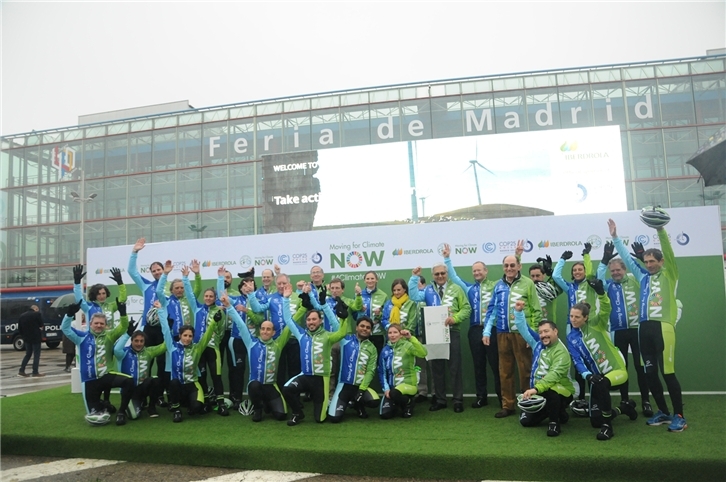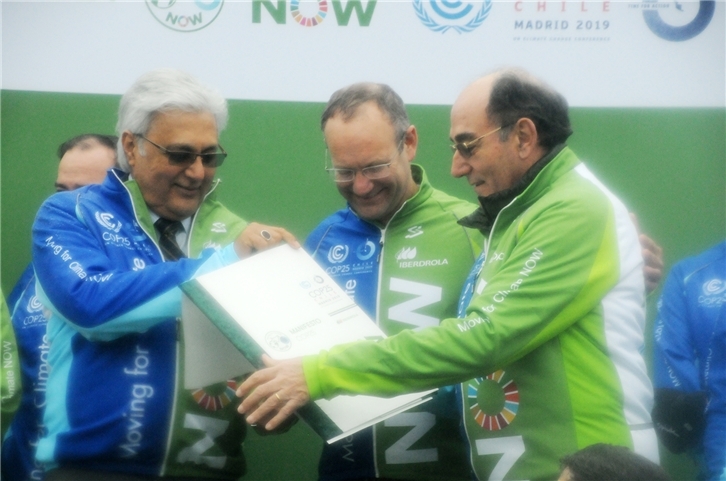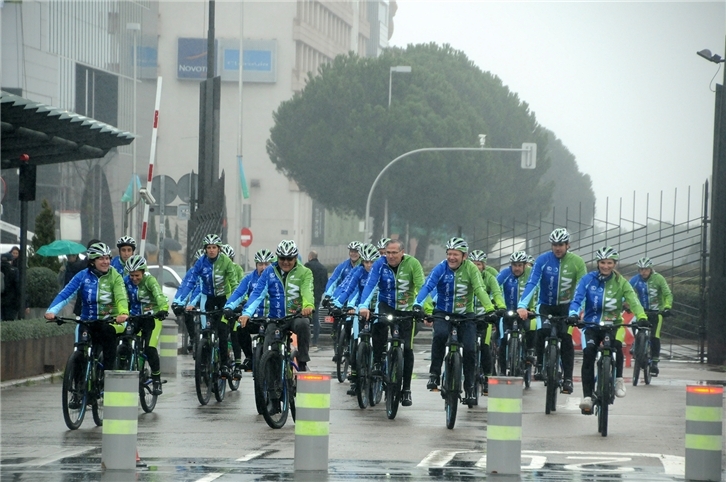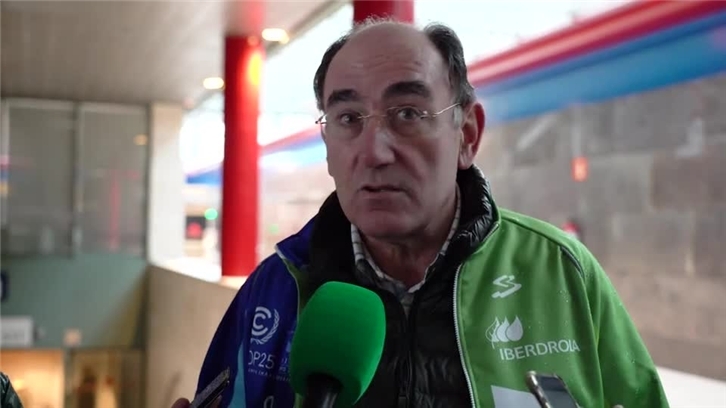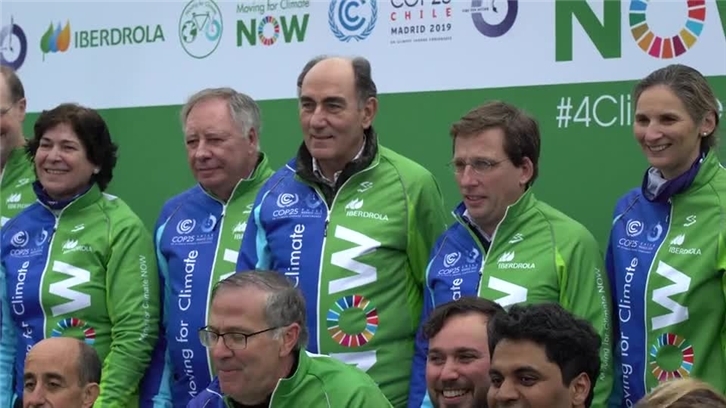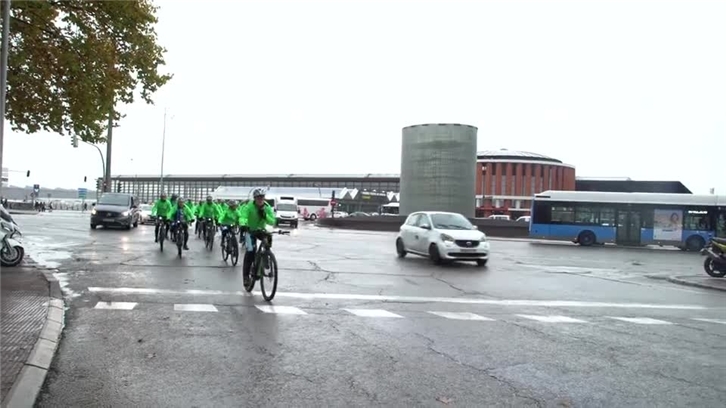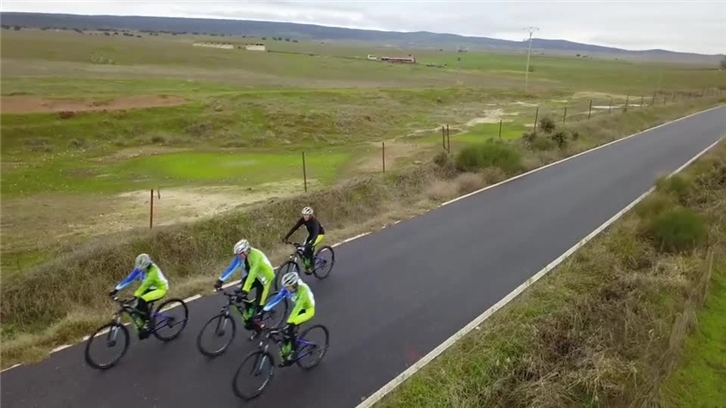News
With the support from the United Nations Framework Convention on Climate Change (UNFCCC) and the Climate Change Summit
Moving for Climate NOW arrives at COP25 and delivers its Manifesto to the United Nations
- The chairman of Iberdrola, Ignacio Galán, welcomed the cycling team and encouraged them "to continue fighting climate change so as to leave a habitable world for generations to come.” “The decade which is about to begin must be the decade of action and 2020 the year of ambition: the Paris Agreement is already in force and we must harness all available resources to comply with it,” he added.
- After travelling 500 kilometres on electric bicycles for five days, this initiative has stressed to the UNFCCC, the Chilean Presidency and other authorities that there is a pressing need to set more ambitious climate targets if we are to achieve zero net emissions by 2050.
- The meeting was attended by the executive vice-secretary of the UNFCCC, Ovais Sarmad; the high-level Chilean climate champion, Gonzalo Muñoz; the mayor of Madrid, José Luis Martínez-Almeida; the high commissioner for the 2030 Agenda 2030, Cristina Gallach, and the chairman of IFEMA, Clemente González
The Moving for Climate NOW cycle initiative, promoted by Iberdrola with support from the United Nations Framework Convention on Climate Change (UNFCCC) and COP25, arrived at the Climate Summit today, which starts in Madrid tomorrow under the presidency of Chile.
After leaving Salamanca last Tuesday and after more than 500 kilometres travelling by electric bicycle through Castilla-León, Extremadura, Castilla-La Mancha and the Comunidad de Madrid, the Moving for Climate NOW team has delivered its Manifesto for Climate Action to the Executive Secretariat of the United Nations Framework Convention on Climate Change.
During the meeting, on the eve of the COP, Ignacio S. Galán, chairman of Iberdrola, stressed that "we have a moral obligation to combat climate change and to leave a habitable world for future generations.” During his address he added: “The decade which is about to begin must be the decade of action and 2020 the year of ambition: the Paris Agreement is already in force and we must harness all available resources to comply with it”
The Deputy Executive Secretary of the UNFCCC, Ovais Sarmad, thanked the Moving for Climate NOW cyclists for their efforts “because they send a very strong message to the world. And the message is: the fight against climate change requires participation from all segments of society.” Sarmad explained that “To bring a systemic change and address the climate emergency, we need governments, the private sector, institutions and individuals to work together in urgently scaling up their efforts to reduce emissions.”
According to the climate champion of this COP25 and representative of the Chilean Presidency, Gonzalo Muñoz, this initiative is “an example that we must escalate to other areas of society in order to promote clean mobility and renewable energy.” Muñoz also pointed out that this move “reflects the support that the government and people of Spain are offering to Chile for the purposes of the summit.”
The fifth Moving for Climate NOW team, comprising some fifty representatives from several organisations and countries, was also received by the mayor of Madrid, José Luis Martínez-Almeida, the high commissioner for the 2030 Agenda of the Spanish government, Cristina Gallach, and the chairman of IFEMA, Clemente González.
The Manifesto delivered today sets out, point by point, the fundamental principles on which this team believes action is needed to address climate challenges and meet the objectives of the Paris Agreement. It points to "the need for increased climate ambition and a shift towards scenarios that limit the increase in global average temperatures to 1.5ºC, which involves achieving zero net emissions by 2050".
To achieve this, the following advances must be made:
- The urgency of uniting efforts in all areas, ensuring support measures for the most vulnerable.
- The importance of seeing the fight against climate change as an opportunity to build a sustainable economic model, rather than as a threat.
- The need to accelerate the energy transition by committing to renewable energy.
- The importance of mobilising resources to improve climate adaptation.
The fifth ‘Moving for Climate NOW’
Moving for Climate NOW has now completed its fifth edition, with the cycling team having already travelled more than 3,700 kilometres since the first one, which took them from Bilbao to COP21 in Paris. They then reached the COP22 in Marrakech from Seville, the COP23 in Bonn from Paris and the COP24 in Katowice, Poland, from Vienna.
In all five expeditions, participants used electric bicycles with the intention of showing the viability of an alternative, healthy and environmentally friendly means of transport on a long-distance route. The expedition also verified its emissions with CeroCO2 and offset its carbon footprint by buying carbon credits on the United Nations “Climate Neutral Now” and Zero Emissions platforms.
The Moving for Climate NOW initiative is aligned with the United Nations 2030 Agenda Sustainable Development Goals (SDGs). It is particularly linked to Goal 13 - Climate Action - and Goal 17 - Partnerships to Achieve the Goals. It also contributes to points 5 -gender equality- and 7 -affordable and non-polluting energy-.
Over the last five years, Moving for Climate NOW has included representatives from international organisations such as the European Commission, the European Investment Bank, the United Nations Convention for Climate Change (UNFCC), the World Resources Institute (WRI), the International Energy Agency (IEA) and the International Renewable Energy Agency (IRENA); institutions such as the Spanish Office of Climate Change, the Moroccan Economic, Social and Environmental Council, the Biodiversity Foundation and Seville City Council; initiatives such as the World Business Council for Sustainable Development, Sustainable Energy for All (SEforALL) and the Carbon Disclosure Project (CDP), as well as civil society through NGOs including ECODES, the Red Cross and ActionAid, and universities such as Comillas Pontifical University and the Federal University of Rio de Janeiro and the Institute for Sustainable Development (IISD).








